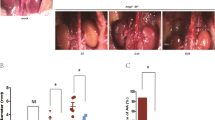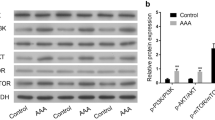Abstract
Background
Abdominal aortic aneurysms (AAA) are a critical global health issue with increasing prevalence. Dexmedetomidine (DEX) is a highly selective α2-adrenoceptor agonist that has previously been shown to play a protective role in AAA. Nevertheless, the mechanisms underlying its protection effect remain not fully understood.
Methods
A rat AAA model was established via intra-aortic porcine pancreatic elastase perfusion with or without DEX administration. The abdominal aortic diameters of rats were measured. Hematoxylin-eosin and Elastica van Gieson staining were conducted for histopathological observation. TUNEL and immunofluorescence staining were utilized to detect cell apoptosis and α-SMA/LC3 expression in the abdominal aortas. Protein levels were determined using western blotting.
Results
DEX administration repressed the dilation of aortas, alleviated pathological damage and cell apoptosis, and suppressed phenotype switching of vascular smooth muscle cells (VSMCs). Moreover, DEX activated autophagy and regulated the AMP-activated protein kinase/mammalian target of the rapamycin (AMPK/mTOR) signaling pathway in AAA rats. Administration of the AMPK inhibitor attenuated the DEX-mediated ameliorative effects on AAA in rats.
Conclusion
DEX ameliorates AAA in rat models by activating autophagy via the AMPK/mTOR pathway.





Similar content being viewed by others
Data availability
The datasets used during the current study are available from the corresponding author on reasonable request.
References
Stepien KL, Bajdak-Rusinek K, Fus-Kujawa A, Kuczmik W, Gawron K. Role of extracellular matrix and inflammation in abdominal aortic aneurysm. Int J Mol Sci. 2022;23(19):11078.
Haque K, Bhargava P. Abdominal Aortic Aneurysm. Am Family Phys. 2022;106(2):165–72.
Umebayashi R, Uchida HA, Wada J. Abdominal aortic aneurysm in aged population. Aging. 2018;10(12):3650–1.
Sakalihasan N, Michel JB, Katsargyris A, et al. Abdominal aortic aneurysms. Nat Rev Disease Primers. 2018;4(1):34.
Renfeng Q, Shuxiao C, Peixian G, et al. ADAM10 attenuates the development of abdominal aortic aneurysms in a mouse model. Mol Med Rep. 2021;24(5):774.
Bao W, Morimoto K, Hasegawa T, et al. Orally administered dipeptidyl peptidase-4 inhibitor (alogliptin) prevents abdominal aortic aneurysm formation through an antioxidant effect in rats. J Vasc Surg. 2014;59(4):1098–108.
Wang P, Wang W, Peng X, Ruan F, Yang S. Effect of chromogranin A N-terminal fragment vasostatin-1 nano-carrier transfection on abdominal aortic aneurysm formation. Bioengineered. 2021;12(2):11018–29.
Keating GM. Dexmedetomidine: A Review of Its Use for Sedation in the Intensive Care Setting. Drugs. 2015;75(10):1119–30.
Qiu Z, Lu P, Wang K, et al. Dexmedetomidine inhibits neuroinflammation by altering microglial M1/M2 polarization through MAPK/ERK pathway. Neurochem Res. 2020;45(2):345–53.
Zhang Q, Liu XM, Hu Q, et al. Dexmedetomidine inhibits mitochondria damage and apoptosis of enteric glial cells in experimental intestinal ischemia/reperfusion injury via SIRT3-dependent PINK1/HDAC3/p53 pathway. J Trans Med. 2021;19(1):463.
Dai M, Zhu X, Zeng S, et al. Dexmedetomidine protects cells from angiotensin II-induced smooth muscle cell phenotype switch and endothelial cell dysfunction. Cell Cycle. 2023;22(4):450–63.
Yu Q, Li Q, Yang X, et al. Dexmedetomidine suppresses the development of abdominal aortic aneurysm by downregulating the mircoRNA-21/PDCD 4 axis. Int J Mol Med. 2021;47(5):90.
Li YJ, Lei YH, Yao N, et al. Autophagy and multidrug resistance in cancer. Chin J Cancer. 2017;36(1):52.
Wang L, Liu S, Pan B, et al. The role of autophagy in abdominal aortic aneurysm: protective but dysfunctional. Cell Cycle (Georgetown, Tex). 2020;19(21):2749–59.
Salmon M, Spinosa M, Zehner ZE, Upchurch GR, Ailawadi G. Klf4, Klf2, and Zfp148 activate autophagy-related genes in smooth muscle cells during aortic aneurysm formation. Physiol Reports. 2019;7(8):e14058.
Wu QY, Cheng Z, Zhou YZ, et al. A novel STAT3 inhibitor attenuates angiotensin II-induced abdominal aortic aneurysm progression in mice through modulating vascular inflammation and autophagy. Cell Death Dis. 2020;11(2):131.
Li MY, Zhu XL, Zhao BX, et al. Adrenomedullin alleviates the pyroptosis of Leydig cells by promoting autophagy via the ROS-AMPK-mTOR axis. Cell Death Dis. 2019;10(7):489.
Lin M, Hua R, Ma J, et al. Bisphenol A promotes autophagy in ovarian granulosa cells by inducing AMPK/mTOR/ULK1 signalling pathway. Environ Int. 2021;147:106298.
Yang T, Feng X, Zhao Y, et al. Dexmedetomidine enhances autophagy via α2-AR/AMPK/mTOR pathway to inhibit the activation of NLRP3 inflammasome and subsequently alleviates lipopolysaccharide-induced acute kidney injury. Front Pharmacol. 2020;11:790.
Schack AS, Stubbe J, Steffensen LB, et al. Intraluminal infusion of Penta-Galloyl Glucose reduces abdominal aortic aneurysm development in the elastase rat model. PloS One. 2020;15(8):e0234409.
He J, Li N, Fan Y, et al. Metformin inhibits abdominal aortic aneurysm formation through the activation of the AMPK/mTOR signaling pathway. J Vasc Res. 2021;58(3):148–58.
Melin LG, Dall JH, Lindholt JS, et al. Cycloastragenol inhibits experimental abdominal aortic aneurysm progression. Biomedicines. 2022;10(2):359.
Liu H, Zhang Y, Song W, Sun Y, Jiang Y. Osteopontin N-terminal function in an abdominal aortic aneurysm from apolipoprotein E-deficient mice. Front Cell Dev Biol. 2021;9:681790.
Ren J, Han Y, Ren T, et al. AEBP1 promotes the occurrence and development of abdominal aortic aneurysm by modulating inflammation via the NF-κB pathway. J Atherosclerosis Thrombosis. 2020;27(3):255–70.
Wang Y, Li X, Huang X, et al. Sauchinone inhibits angiotensin II-induced proliferation and migration of vascular smooth muscle cells. Clin Exp Pharmacol Physiol. 2020;47(2):220–6.
Ramadan A, Al-Omran M, Verma S. The putative role of autophagy in the pathogenesis of abdominal aortic aneurysms. Atherosclerosis. 2017;257:288–96.
Itakura E, Mizushima N. Characterization of autophagosome formation site by a hierarchical analysis of mammalian Atg proteins. Autophagy. 2010;6(6):764–76.
Bjørkøy G, Lamark T, Pankiv S, et al. Monitoring autophagic degradation of p62/SQSTM1. Methods Enzymol. 2009;452:181–97.
Yu Q, Zou L, Yuan X, Fang F, Xu F. Dexmedetomidine protects against septic liver injury by enhancing autophagy through activation of the AMPK/SIRT1 signaling pathway. Front Pharmacol. 2021;12:658677.
Zhao Y, Feng X, Li B, et al. Dexmedetomidine protects against lipopolysaccharide-induced acute kidney injury by enhancing autophagy through inhibition of the PI3K/AKT/mTOR pathway. Front Pharmacol. 2020;11:128.
Ke R, Xu Q, Li C, Luo L, Huang D. Mechanisms of AMPK in the maintenance of ATP balance during energy metabolism. Cell Biol Int. 2018;42(4):384–92.
Chen M, Jing D, Ye R, Yi J, Zhao Z. PPARβ/δ accelerates bone regeneration in diabetic mellitus by enhancing AMPK/mTOR pathway-mediated autophagy. Stem Cell Res Ther. 2021;12(1):566.
Chen Y, Li Y, Li C, et al. Dexmedetomidine alleviates pain in MPTP-treated mice by activating the AMPK/mTOR/NF-κB pathways in astrocytes. Neurosci Lett. 2022;791:136933.
Funding
The work was supported by Science and Technology Plan Project of Jiangxi Health Commission (Grant no.202210410).
Author information
Authors and Affiliations
Contributions
Min Dai conceived and designed the experiments. Min Dai, Simin Zeng, Ruilin Hu, Muqi Li, Qiang Liu, Yu Wang and Qi Yu carried out the experiments. Min Dai and Qi Yu analyzed the data. Min Dai and Qi Yu drafted the manuscript. All authors agreed to be accountable for all aspects of the work. All authors have read and approved the final manuscript.
Corresponding author
Ethics declarations
Ethical Approval
All animal experiments were approved by the Ethics Committee of The First Affiliated Hospital of Nanchang University and implemented following the NIH Guide for the Care and Use of Laboratory Animals.
Consent to Participate
Not applicable
Consent to Publish
Not applicable
Conflict of Interest
The authors declare no competing interests.
Additional information
Publisher’s Note
Springer Nature remains neutral with regard to jurisdictional claims in published maps and institutional affiliations.
Supplementary Information
ESM 1
(DOCX 19 kb)
Rights and permissions
Springer Nature or its licensor (e.g. a society or other partner) holds exclusive rights to this article under a publishing agreement with the author(s) or other rightsholder(s); author self-archiving of the accepted manuscript version of this article is solely governed by the terms of such publishing agreement and applicable law.
About this article
Cite this article
Yu, Q., Zeng, S., Hu, R. et al. Dexmedetomidine Alleviates Abdominal Aortic Aneurysm by Activating Autophagy Via AMPK/mTOR Pathway. Cardiovasc Drugs Ther (2023). https://doi.org/10.1007/s10557-023-07483-8
Accepted:
Published:
DOI: https://doi.org/10.1007/s10557-023-07483-8




